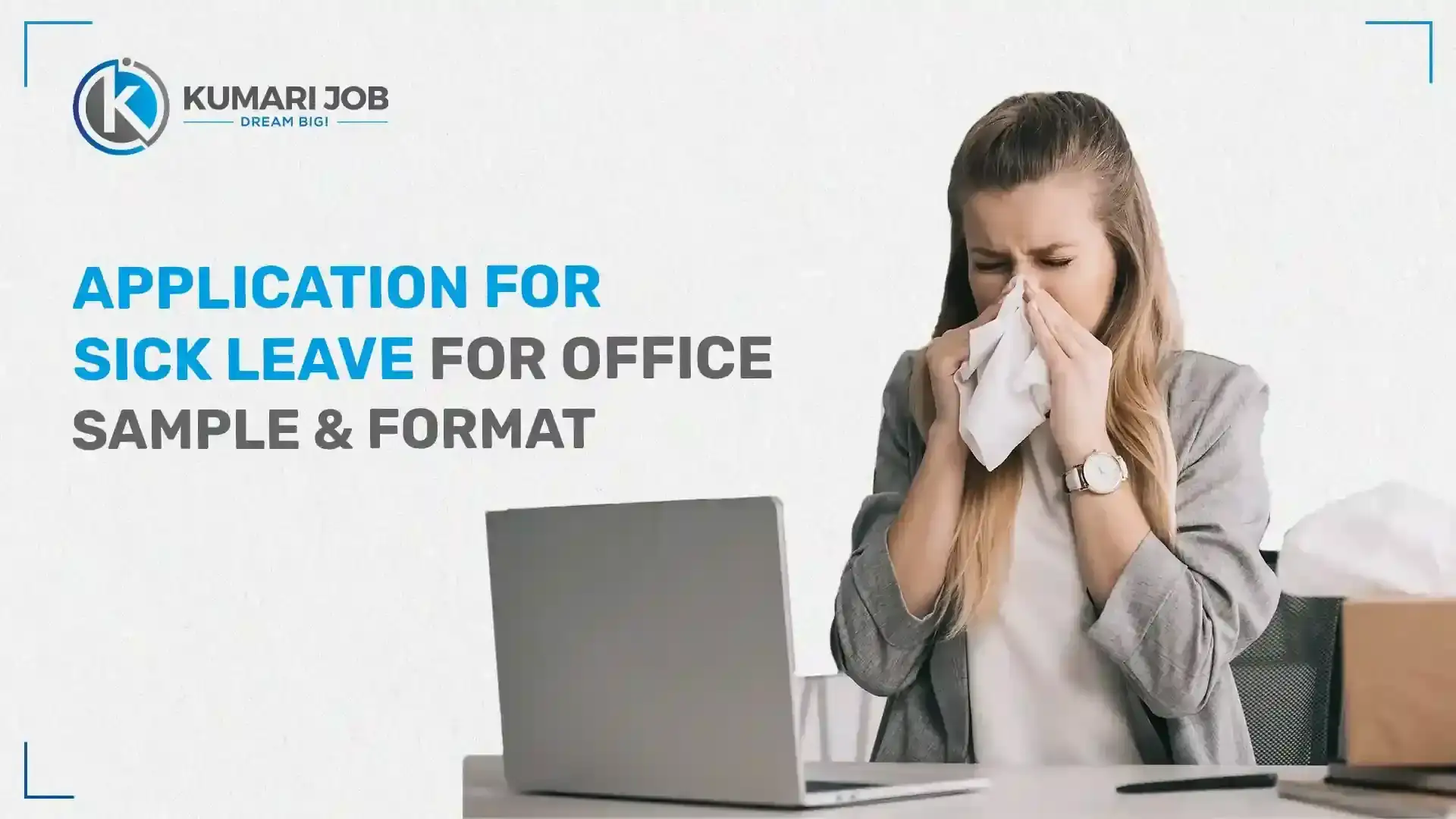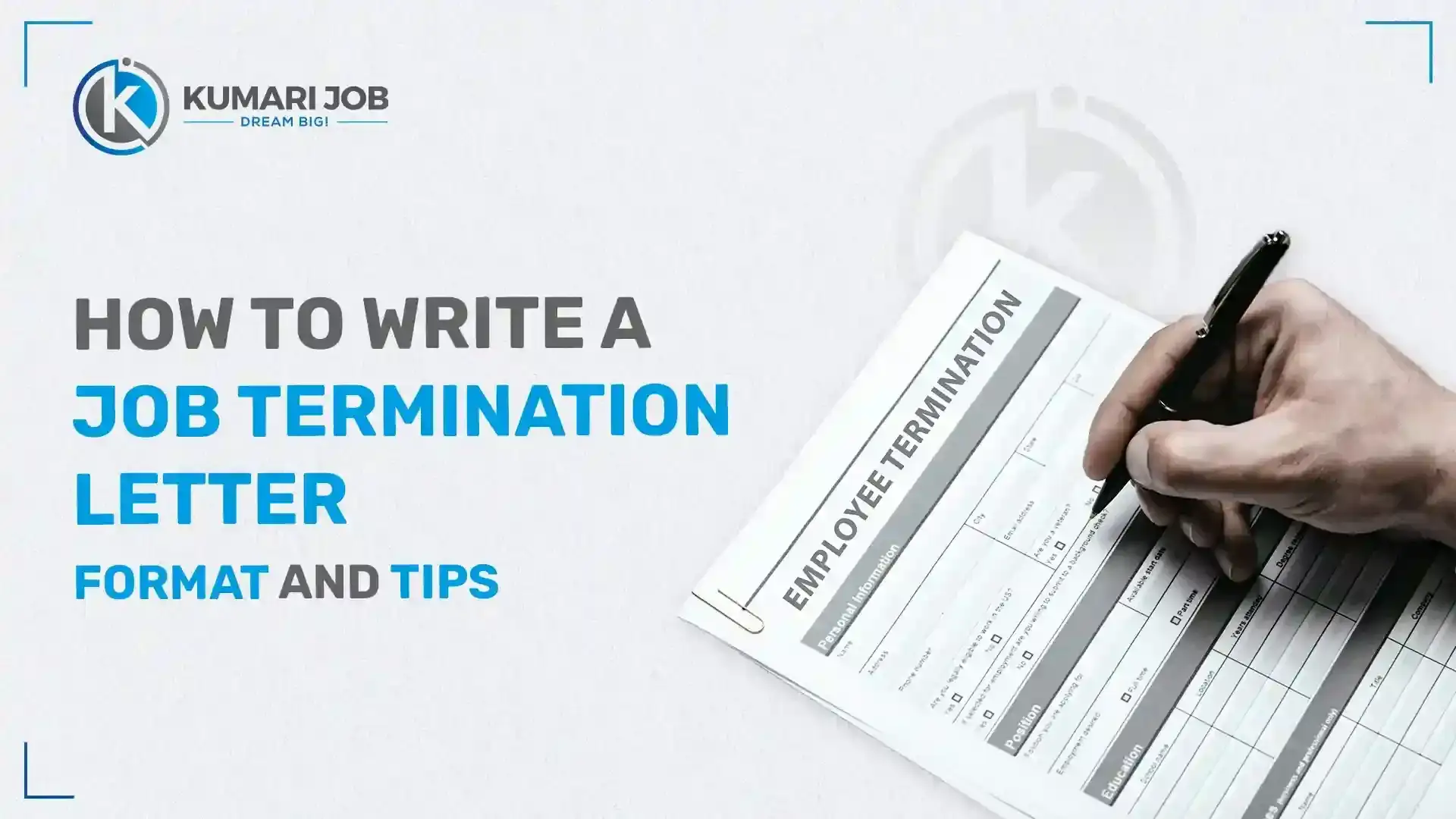
Falling sick is part of life, but knowing how to ask for leave in the right way makes a big difference. Whether you work in an office, go to college, or school, a decent sick leave application is not just a formality but also a matter of respect for rules and consideration for others to make plans according to your absence.
The structure may vary a little depending on where you're sending it, but the core idea is always the same: be professional, polite, and concise.
In this post, we will discover everything you need to write a practical application for sick leave for office, college, or school, including simple tips, key information to include, and ready-to-use samples. So, if you don't know where to start, no problem, we've got you covered!
In this blog
- What is a Sick Leave Application?
- Why is it Important?
- How to Write a Sick Leave Application?
- Key Elements to Include in a Sick Leave Application
- Common Mistakes to Avoid
- Sample Sick Leave Application for Office (Employee)
- Sample Sick Leave Application for College (Student)
- Sample Sick Leave Application for School (Student/Parent)
- Tips for Writing a Good Sick Leave Application
- Conclusion
- Frequently Asked Questions
What is a Sick Leave Application?
A sick leave application is an official written notice to inform your school, college, or workplace that you are unable to attend work or school due to illness. It's an official and polite way to inform others that you require some time to rest and recover. This written application notifies your boss, teacher, or administrative personnel of your absence and arranges any necessary changes. Whether it's via email, letter, or through an online portal, the intent is to say that you're sick clearly. It also ensures that your leave is on record.
You're generally required to submit a sick leave application when you're so ill that you can't go to work or class, especially if the leave is for more than a day or two. It can be used for planned medical leaves (like surgery) and unforeseen illnesses (like fever). Submitting work on time ensures understanding and prevents confusion. In the business sector, it helps managers plan workloads. In schools and universities, it helps with taking attendance and scheduling make-up opportunities. Some colleges or offices may even require a doctor's note as proof, based on their policy.
It's important to keep your sick leave message formal and brief because it shows you're professional. A professionally written message makes sure your reason for absence is displayed without causing unnecessary communication. It also creates trust, showing you're committed to your work, regardless of how ill you are. Using polite language, accurate dates, and an appropriate format shows respect for the receiver. Remember, even a short message can be radically effective if written properly.
Why is it Important?
It is important to write a sick leave letter because workplaces and schools have rules about attendance. This helps keep things fair for everyone. By writing a proper leave letter, you are following these rules and showing that you respect them. It also helps you avoid any problems or penalties for being absent without permission. In simple terms, it makes sense to do this.
A neat application also simplifies it for your boss or teacher to plan in advance when you're away. At work, tasks can be reallocated to fellow workers; for school, teachers can tick you off and assign your work later. It helps prevent confusion and keeps the work running smoothly. It is also easier to track attendance if all absences are accounted for.
For the majority of cases, especially at work, a request for sick leave is a formal paper for payroll, leave balance or even health insurance benefits. If you ever need to make an insurance claim or use paid sick hours, it is convenient to have this on hand. A physician's note can even be requested by some employers, making your request that much more credible. By not doing so, you risk losing paid time off or having issues with HR. Thus, writing a proper application helps to protect both your health and your rights.
How to Write a Sick Leave Application?
To write a sick leave application, first select the appropriate format for your organization or educational institution. Next, write a proper and respectful message detailing your circumstances. Be sure to send it promptly and proofread it carefully before submitting it. These straightforward steps will ensure your request is professional and will receive a positive reception.
1. Select Your Format
The initial step is to determine how to submit your sick leave application. Most offices currently prefer email because it is efficient and easy to trace. If your institution or school has an HR portal, applying for leave through it may be the official procedure. Some organizations still want a formal written letter, particularly for extended leaves or official documents. Use the format that your organization prefers.
Using the correct format shows that you know and respect their processes. For example, an informal email is suitable for short, unexpected illnesses, but a formal letter may be more appropriate for planned time off due to medical reasons. In case you are unsure, ask your HR department or instructor. Most importantly, make sure your message reaches the right person in the right way.
2. Preparing the Message
When writing your request for sick leave, stay professional and polite in tone. Start with the appropriate person to address, e.g., your boss or teacher, with respect. Clearly inform them that you are sick and need to be away, specifying the exact dates. Avoid using too much irrelevant information regarding your sickness; a short explanation will suffice.
Be concise and direct so that it is easy to understand for the reader. Politeness shows respect, and clarity prevents confusion. You can also include whether you will be available during emergencies or have arranged otherwise for someone to do your job. Ending with a thank you is a good idea. Your message, in general, should be professional but genuine.
3. Timing
Timeliness is extremely important when applying for sick leave. When you expect a planned medical leave in advance, try to apply as early as possible. This gives your teacher or manager sufficient time to arrange things. For acute sickness, like fever or the flu, give your school or workplace notice as soon as you can, if possible, the same day.
Immediate notification avoids confusion and shows responsibility. If you are too sick to make the delivery in person, have someone help you provide the proper notice. Delays or failure to notice could result in hassle, like losing paid time off or encountering attendance issues. So, timing should always be kept in mind to make the process convenient for everyone.
4. Proofread
Make sure you proofread your sick leave application once before submitting it. Check for any spelling mistakes or grammatical errors that can make your message unclear. Make sure the dates you give for your leave are correct. Wrong dates can create confusion. Also, ensure you've spoken to the right person using the appropriate title.
A message that is clear and error-free looks professional and shows that you've made some effort in your communication. It avoids follow-up questions and processing hold-ups. It may also be helpful to read your messages aloud or have someone else do so in order to detect mistakes. Doing this a little bit extra has a favorable impact and enhances the chances of your leave being approved without trouble.
Key Elements to Include in a Sick Leave Application
An effectively written sick leave application should include some very important details so that the application is professional and accessible. Including these elements allows the recipient to understand your request easily without any confusion and act upon it. Let us look at the key components that you should always include in your application.
1. Date
The date on which you write or send the application is important. It helps keep a clean record of when you really informed your employer, school, or college of your absence. Mentioning the date also proves that you are responsible and timely. Place the date at the top of the letter or email, and it will be easily available.
2. Recipient's Name and Designation
When writing to the proper person, you're being professional and respectful. Use your supervisor, teacher, principal, or manager's full name and title. This will get your leave application to the proper person responsible for approving your leave. Avoid imprecise greetings like "To whom it may concern" unless you really don't know who will be reading it.
3. Subject Line
The subject line notifies the reader in a few words why your message is being sent. For example, "Sick Leave Application for [Your Name]" lets the reader know immediately what your letter or email is about. Having a clear subject line makes it easier for the reader to prioritize and categorize their documents or emails.
4. Reason for Leave
It is important to state the reason for your leave, but it should not be too detailed and personal. You don't need to explain everything to them about what is happening to you; a simple reason like "due to illness" or "medical reasons" will do. This allows your employer or instructor to understand why you can't attend work or school without being privy to your personal affairs.
5. Duration of Leave
Specifically, state when you start and finish your requested leave. The recipient then arranges for your absence, redates work, or accurately keeps attendance. If you cannot specify a return date, say that you'll inform them as soon as possible.
6. Contact Information (if necessary)
If you can and wish to, please provide your contact details for emergencies. This means that you're serious and within reach for emergency calls even when you're not present. But in case you need to rest completely, it's fine to say that you won't be available when you're on leave.
7. Signature
Ending your application with your complete name and your signature gives the official touch. It is acceptable to type your full name when sending e-mails, but a hand-written signature when sending printed letters. The inclusion of your designation or class ensures clear identification, especially when you are employed in large companies or are studying.
Common Mistakes to Avoid
Even a simple application for sick leave can go wrong if a couple of important things are ignored. Little errors will make your message appear unprofessional and may even postpone approval. To ensure your application is successful, it's essential to avoid some common mistakes individuals tend to make. Here's what to avoid:
1. Writing Informally or Using Slang
Writing informally using slang or emojis will make your application appear unprofessional. Remember, you're writing to your principal, teacher, or boss, not texting your friend. Messages like "Hey, I'm really sick, lol" are not acceptable. Instead, say polite and respectful sentences like "I am ill and would like to request leave." A professional tone shows that you're serious about the matter. Even if you're close to your manager or teacher, it's best that your leave request be formal. It establishes the tone appropriately and improves the chances of your application being accepted without question.
2. Missing Dates or Unclear Duration
One of the worst mistakes is to forget to include when your leave starts and stops. Your manager or teacher will not know how long to expect to be without you if you fail to include dates. It creates confusion and could delay preparations for your absence. Always include both the starting and ending dates clearly. If you don't have any idea how long you'll be ill, give a provisional return date and say you'll inform them if necessary. It makes it easier for other people to plan their schedules.
3. Not Tactfully Addressing the Right Person
Submitting your application to the wrong person may cause delays or even get you ignored. Confirm who processes leave applications, be it your direct supervisor, HR, or class teacher. Always use their full name and designation in the salutation. "Respected Sir/Madam" or "To whom it may concern" is your last resort if you truly have no idea who the receiver is. It only takes a minute to obtain the correct contact, and by doing so, you are showing responsibility and making a good impression.
4. Forgetting to Sign or Include Contact Information
Leaving out your name, your title, or your contact details makes it hard for the recipient to identify you, especially in large offices or schools. This can delay processing your request or result in follow-up emails just to find out who you are. Sign off your application always with your full name, your position (or class and roll number if you're a student), and your contact number if necessary. For hard copy applications, sign as well. These small things provide authenticity and account for your request properly.
5. Submitting Late (Unless Emergency)
Unless there's an emergency or sudden illness, submitting your application late can give a negative impression. Your school officials or manager need time to reschedule or arrange for substitutes, so advance notice is essential. In the case of planned medical leave, try to inform in advance. If it's a sudden illness, inform us as soon as possible, either in person or through someone else. A late submission with no valid reason can come across as careless and can even affect your leave approval. Being on time shows that you're dependable, even when you're sick.
Related Blog: Tips for Writing a Nepali Job Application Letter
Sample Sick Leave Application for Office (Employee)
Employees should write a sick leave application that is professional, brief, and informative. It should be addressed to the reporting manager or HR and include the reason for leave, duration, and any handover details if needed. If required by company policy, attaching a medical certificate is helpful. A well-structured application shows responsibility and keeps the workflow uninterrupted.
Here is a sample of a sick leave application letter for the office:

Sample Sick Leave Application for College (Student)
College students are expected to write their own sick leave applications to maintain accountability and professionalism. The message should be addressed to the concerned professor or department head, mention the reason for absence, and clearly state the dates. It’s also a good idea to mention your course, year, and willingness to catch up on missed work. A formal and respectful tone is always recommended.
Here is a sample of a sick leave application letter for college:

Sample Sick Leave Application for School (Student/Parent)
When a school student falls sick, it’s important to inform the class teacher or principal in a respectful and timely manner. The application can be written by the student or their parent, depending on the situation and the student's age. It should briefly mention the illness, duration of leave, and include the class and roll number. Keeping it polite and clear helps ensure a smooth approval process.
Here is a sample of a sick leave application letter for school:

Tips for Writing a Good Sick Leave Application
It does not take much effort to draft a great sick leave application if you know what you need to include. A well-written request prevents misunderstandings and shows that you are considerate and responsible. The following are helpful guidelines to make your application clear, respectful, and effective:
1. Be Brief
You do not need to write a long essay; just give the main reason you will be absent. Tell them you are ill, mention the dates you will be away, and let them know the date you intend to come back. A short and to-the-point message is easier to read and respond to. Avoid unnecessary information or personal details unless required. One or two paragraphs will usually be enough to say it all.
2. Be Honest and Specific
Be always honest about your situation. If you are sick, simply say so and add a doctor's appointment or medical certificate if available. You don't have to describe your symptoms in detail; just a simple line, such as "due to fever" or "doctor-advised rest," is enough. Honesty is trusting and renders your request believable. If the illness is serious or long-term, it is okay to offer a bit more explanation.
3. Use a Formal Tone
Even if you are familiar with your teacher or employer, be respectful and professional in tone. This means avoiding informal words, slang, or emojis. Start with a formal salutation like "Dear Sir/Madam" or their title and name, and end your letter or email with "Sincerely" or "Thank you." This professional tone shows that you value the person and the process and gives a good impression.
4. Submit on Time if Possible
Timing matters. If you have advance notice that you'll be taking sick leave for a planned medical operation, for example, try to give your manager or teacher early notice. In the case of acute illness, let them know as soon as possible, either personally or through another person. This allows your school or workplace time to make rearrangements and ensures continuity of operations. Late claims with no explanation come across as sloppy and might not be granted readily.
5. State Alternative Contact or Handover
If you're working, and someone else will be covering your duties while you're away, mention this in your message. You can also say whether you can be reached by phone or email if something urgent arises. This shows that you are still thinking about work and are attempting not to disrupt it. If you're a student, it's nice to mention that you'll catch up on any missed work upon your return. It assures the reader that you're taking care of things responsibly, even though you're ill.
Conclusion
Writing a sick leave application might seem easy, but it really matters. Whether you’re working or studying, a clear and polite message shows you care about others' time. By using the right format, adding important details, and avoiding mistakes, you can make it easier to get your leave approved quickly.
We have everything you need, from the right format to ready-made samples you can use. So, next time you feel sick, you’ll know what to do. Keep this guide close or save it for later. It will help you when you need it most.
Taking a break due to illness? Once you're back on your feet, explore thousands of jobs in Nepal in Kumari Job—from internships to full-time roles across every field. Visit Kumari Job and find the right opportunity waiting for you.







Loading Comments...